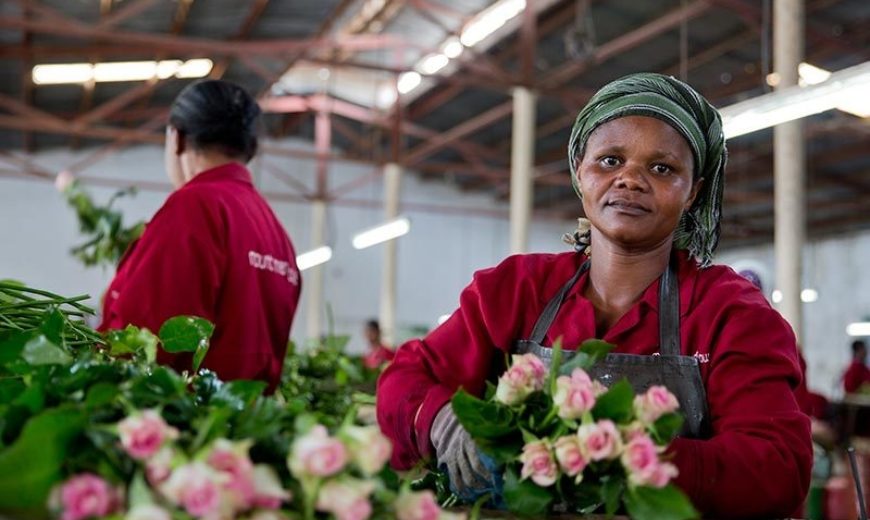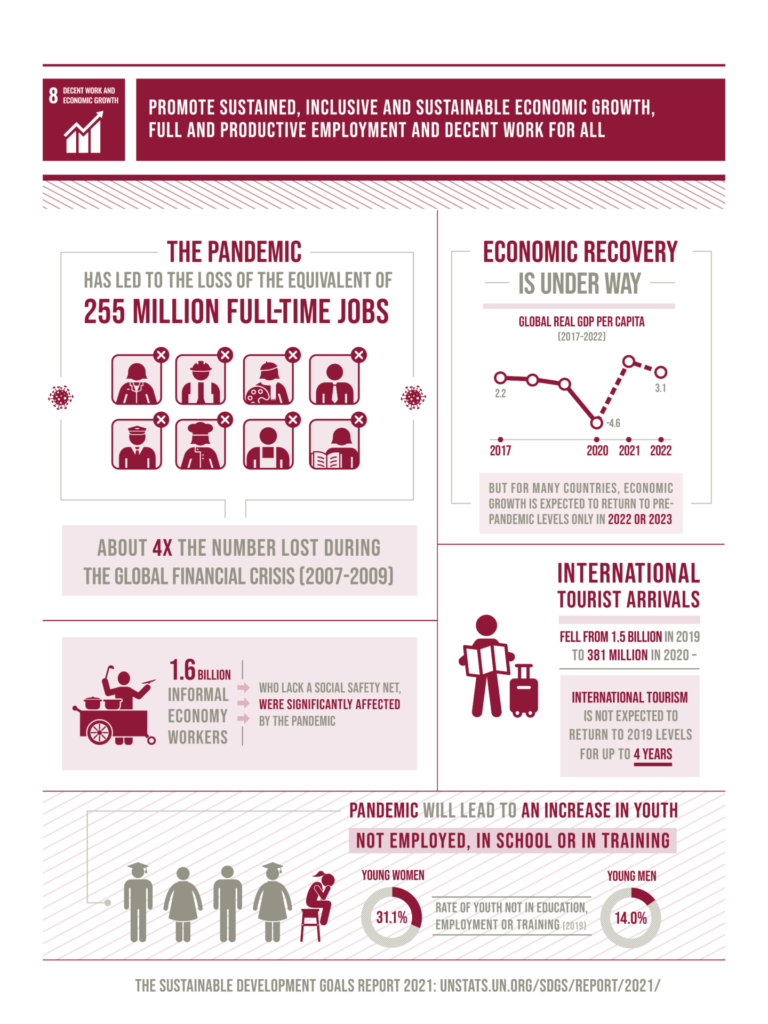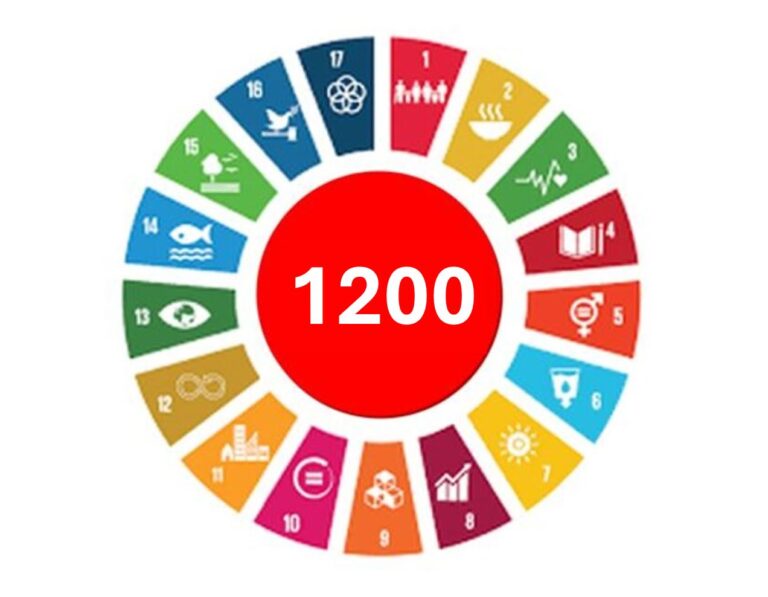Young people are abandoning farming, while agricultural workers often work in precarious conditions for little pay. We must tackle these issues, so economic growth can benefit the many, not the few.

Agriculture provides jobs for more than a billion people globally. Yet millions of farmers and farm workers don’t earn enough to pay for the basics like decent food, housing, and education, let alone save for unexpected setbacks or for a dignified retirement. Seventy percent of the more than 152 million children in child labor are working in agriculture. The race to the bottom on prices – particularly in coffee, cocoa, and bananas – means the risk of child and adult exploitation gets worse. Consequently, young people are leaving farming communities in droves, often ending up in informal and insecure work in cities or on larger farms.
“Inclusive and sustainable economic growth, employment and decent work for all” can only be achieved if farmers get a decent price for their crop and if workers have safe, secure, and fairly paid jobs.
Fairtrade is Improving wages for workers
In 2017, Fairtrade took a decisive step towards improving wages in the flowers and plants sector, by changing the Fairtrade Flower Standard to include a minimum base wage.
Since then, workers at Mount Meru flower farm in Tanzania have seen a 30 percent rise in their wages. Nearly all workers get additional payments on top of the base wage, depending on their roles and responsibilities.
The foothills of the beautiful Arusha national park in Tanzania are an unlikely setting for a quiet revolution in workers’ rights. In the shadow of the extinct Mount Meru volcano – at 4,500m the fourth highest peak in Africa – laborers on the Mount Meru flower farm grow more than 30 varieties of roses for export, mainly to Europe.
It’s hard, hot, and humid work in the vast greenhouses, despite the modern ventilation systems. The workers put in long hours growing, cutting, and packing the delicate flowers for consumers in developed countries to enjoy all year round. They used to earn the national minimum wage of 100,000 Tanzanian Shillings a month – about €40.
That’s when Fairtrade stepped in. In 2017, we took a decisive step towards improving wages in the flowers and plants sector, by changing our Flower Standard to include a minimum base wage. Newly certified Fairtrade flower farms had to pay the base wage from day one, whilst existing ones had one year to reach 85 percent, and two years to arrive at 100 percent.
Mount Meru, which has been Fairtrade certified since 2008, was one of many flower farms which had to comply with the new requirements. Since the revised standard came in, workers at Mount Meru have seen a 30 percent rise in their wages. In addition to the base wage, nearly all workers get additional payments depending on their roles and responsibilities at the farm.
“I appreciate what Fairtrade has done because the farm had to increase the base wage,” says one worker who is also a union member. “The economic situation is still difficult but Fairtrade has certainly helped. On behalf of the workforce, I want to say that we really appreciate the change that Fairtrade has brought about.”
Fairtrade acknowledges that workers’ wages around the world – not just on flower farms – are often way below what they and their families need to enjoy a decent life. That’s why – as co-founders of the Global Living Wage Coalition – we campaign for a wage that allows workers to enjoy a decent standard of living.
“We shouldn’t underestimate how difficult it is to get a living wage for agricultural workers,” says Wilbert Flinterman, Fairtrade International’s Senior Advisor Workers’ Rights and Trade Union Relations. “Living wages should be based on collective bargaining agreements which are economically sustainable and can be claimed by workers as a right. They shouldn’t be subject to the whims of the market and volatile price fluctuations.”
At Mount Meru, as on other Fairtrade certified farms, workers also receive the unique Fairtrade Premium – 10 percent for every stem sold – which they can choose to invest in healthcare, education, or other projects of their choice. The farm sells approximately 15 percent of its production under Fairtrade conditions, for which it receives Fairtrade Premium money.
“We have benefited from an increase in salaries but there is more than that,” says Mount Meru employee Sirila Ion. “Because of Fairtrade, my children and even my husband could go to school and further their education. Besides this, the entire community benefits from Fairtrade projects such as a clean water supply for the workers’ village and a new canteen and workers’ kitchen.”
The Fairtrade Premium has also been used to finance school fees for children as well as to provide continuing education opportunities to the workers and their families. “Fairtrade has supported not only my education but also the education of my brother, who is now a hotel manager, and of my sister,” says Damian, another Mount Meru worker. “I have also been able to build a house with the revolving fund set up with money from the Fairtrade Premium.”
Updated December 8. 2024 & December 8. 2023 (originally published December 8. 2021)

United Nations Global Goals for Sustainable Development
Goal 8 promotes inclusive and sustainable economic growth, employment, and decent work for all.
Multiple crises are seriously threatening the global economy. Global real GDP per capita growth is forecast to slow down in 2023, and with increasingly challenging economic conditions, more workers are turning to informal employment.
Globally, labor productivity has increased, and the unemployment rate has decreased. However, more progress is needed to increase employment opportunities, especially for young people, reduce informal employment and labor market inequality (particularly regarding the gender pay gap), promote safe and secure working environments, and improve access to financial services to ensure sustained and inclusive economic growth.
The global unemployment rate declined significantly in 2022, falling to 5.4 percent from a peak of 6.6 percent in 2020 as economies began recovering from the shock of the COVID-19 pandemic. This rate was lower than the pre-pandemic level of 5.5 percent in 2019.
The role of Business
Roughly half the world’s population still lives on the equivalent of about US$2 a day. And in too many places [even the USA], having a job doesn’t guarantee the ability to escape from poverty. Substandard working conditions are often related to poverty, inequality, and discrimination. In many contexts, certain groups – such as workers with disabilities, women workers, youth, and migrants, among others – face particular obstacles in accessing decent work and may be especially vulnerable to abuses.
- Employment growth since 2008 has averaged only 0.1% annually, compared with 0.9% between 2000 and 2007
- Over 60 percent of all workers lack any kind of employment contract
- Fewer than 45 percent of wage and salaried workers are employed on a full-time, permanent basis, and even that share is declining.
- By 2019, more than 212 million people will be out of work, up from the current 201 million
- 600 million new jobs need to be created by 2030, just to keep pace with the growth of the working age population
Businesses are engines for job creation and economic growth and foster economic activity through their value chain. Decent work opportunities are good for business and society. Companies that uphold labor standards across their own operations and value chains face a lower risk of reputational damage and legal liability. Instituting non-discriminatory practices and embracing diversity and inclusion will also lead to greater access to skilled, productive talent.
COVID-19 has disrupted billions of lives and endangered the global economy. The International Monetary Fund (IMF) expects a global recession as bad as or worse than in 2009.
Even before the outbreak of COVID-19, one in five countries – home to billions of people living in poverty – were likely to see per capita incomes stagnate or decline in 2020. Now, the economic and financial shocks associated with COVID-19—such as disruptions to industrial production, falling commodity prices, financial market volatility, and rising insecurity—are derailing the already tepid economic growth and compounding heightened risks from other factors.
COVID-19 response
The COVID-19 pandemic has caused a historic recession with record levels of deprivation and unemployment, creating an unprecedented humanitarian crisis that is hitting the poorest hardest.
In April 2020, the United Nations released a framework for the immediate socio-economic response to COVID-19, as a roadmap to support countries’ path to social and economic recovery. It calls for an extraordinary scale-up of international support and political commitment to ensure that people everywhere have access to essential services and social protection. The socio-economic response framework consists of five streams of work:
- Ensuring that essential health services are still available and protecting health systems;
- Helping people cope with adversity, through social protection and basic services;
- Protecting jobs, supporting small and medium-sized enterprises, and informal sector workers through economic response and recovery programmes;
- Guiding the necessary surge in fiscal and financial stimulus to make macroeconomic policies work for the most vulnerable and strengthening multilateral and regional responses; and
- Promoting social cohesion and investing in community-led resilience and response systems.
These five streams are connected by strong environmental sustainability and gender equality imperative to build back better.
The UN Secretary-General has stressed that the recovery from the COVID-19 crisis must lead to a different economy.
Beyond the immediate crisis response, the pandemic should be the impetus to sustain the gains and accelerate the implementation of long-overdue measures to set the world on a more sustainable development path and make the global economy more resilient to future shocks.
Facts and Figures
- The global unemployment rate in 2017 was 5.6per cent, down from 6.4per cent in 2000.
- Globally, 61percent of all workers were engaged in informal employment in 2016. Excluding the agricultural sector, 51per cent of all workers fell into this employment category.
- Men earn 12.5percent more than women in 40 out of 45 countries with data.
- The global gender pay gap stands at 23 per cent globally and without decisive action, it will take another 68 years to achieve equal pay. Women’s labour force participation rate is 63 per cent while that of men is 94 percent.
- Despite their increasing presence in public life, women continue to do 2.6 times the unpaid care and domestic work that men do.
Goal 8 Targets
8.1 Sustain per capita economic growth in accordance with national circumstances and, in particular, at least 7 percent gross domestic product growth per annum in the least developed countries
8.2 Achieve higher levels of economic productivity through diversification, technological upgrading, and innovation, including through a focus on high-value-added and labor-intensive sectors
8.3 Promote development-oriented policies that support productive activities, decent job creation, entrepreneurship, creativity, and innovation, and encourage the formalization and growth of micro-, small- and medium-sized enterprises, including through access to financial services
8.4 Improve progressively, through 2030, global resource efficiency in consumption and production and endeavor to decouple economic growth from environmental degradation, in accordance with the 10-year framework of programs on sustainable consumption and production, with developed countries taking the lead
8.5 By 2030, achieve full and productive employment and decent work for all women and men, including for young people and persons with disabilities, and equal pay for work of equal value
8.6 By 2020, substantially reduce the proportion of youth not in employment, education, or training
8.7 Take immediate and effective measures to eradicate forced labor, end modern slavery and human trafficking, and secure the prohibition and elimination of the worst forms of child labor, including recruitment and use of child soldiers, and by 2025 end child labor in all its forms
8.8 Protect labor rights and promote safe and secure working environments for all workers, including migrant workers, in particular, women migrants, and those in precarious employment
8.9 By 2030, devise and implement policies to promote sustainable tourism that creates jobs and promotes local culture and products
8.10 Strengthen the capacity of domestic financial institutions to encourage and expand access to banking, insurance, and financial services for all
8.A Increase Aid for Trade support for developing countries, in particular, least developed countries, including through the Enhanced Integrated Framework for Trade-Related Technical Assistance to Least Developed Countries
8.B By 2020, develop and operationalize a global strategy for youth employment and implement the Global Jobs Pact of the International Labour Organization
Links
International Labour Organization
Inquiry into the Design of a Sustainable Financial System: Policy Innovations for a Green Economy
Economic and Social Commission for Asia & the Pacific
Economic and Social Commission for Western Asia
Economic and Social Commission for Africa
Economic and Social Commission for Europe
Economic and Social Commission for Latin America & the Caribbean






15 Comments
Pingback: best silicone dolls
Pingback: mushroom gummies side effects
Pingback: bola 808
Pingback: ฟิล์มกรองแสง
Pingback: ทำความรู้จัก lottobet789
Pingback: trustbet
Pingback: ตรวจ nipt ราคา
Pingback: 5 เว็บหวยออนไลน์ บาทละ 1000
Pingback: Acquista ossicodone online Texas, Acquista Xanax online, Commander Oxycodone 30 mg, dove acquistare ossicodone in linea, Il posto migliore per acquistare Ossicodone in linea, Livraison Oxycodone 30 mg, Ordina Acquista ossicodone online senza prescrizione,
Pingback: shower room bangkok
Pingback: Buy AB A-10 - 5.56MM Online
Pingback: dultogel link
Pingback: 메이저사이트 순위
Pingback: arena breakout cheats
Pingback: ข้อดี เว็บ 123 up